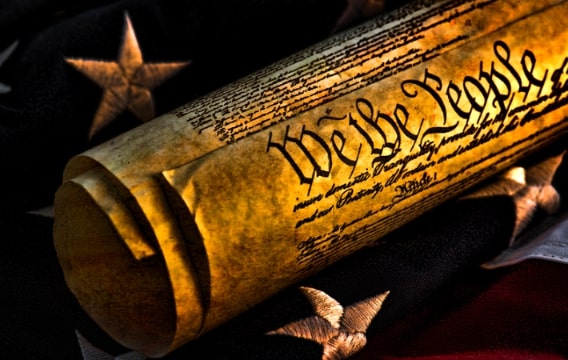Introduction: In this article – the first in a two-part series – Katie Rebecca Garner gives tips for researching your Revolutionary War-era ancestors. Katie specializes in U.S. research for family history, enjoys writing and researching, and is developing curricula for teaching children genealogy.
July is the month we celebrate independence. On 4 July 1776, the U.S. was formed as the colonists declared independence from the British Empire. However, this was not without war and bloodshed. Britain was not so willing to let her colonies go. The colonists wanted to govern themselves rather than be ruled by the king. So the Revolutionary War was fought, and some of our ancestors participated.

Photo credit: https://depositphotos.com/home.html
Records Generated
If you had ancestors who fought in the Revolutionary War, records were created involving them, from which you may learn much about their service and their lives. Service and payroll records were created during the war. Pension and bounty land records were created after the war.
The pension records include applications, testimonies or affidavits of witnesses, and payment vouchers. The application records for veterans include descriptions of the soldier’s service, including his unit and the commanders he served under. If the soldier was applying for a pension because he was disabled, the application would include details of his disability or injury. For widows and orphans’ pensions, the widow or orphan had to prove their relationship to the soldier, his service, and his death. In such cases, the application includes proof of marriage. Sometimes this is a couple’s only extant proof of marriage.
The payment vouchers track the residency of the veteran or widow in six-month increments because that’s how often they were allowed to pick up the payment. If the pensioner moved and had to transfer pension offices, that was recorded, allowing modern genealogists to track migrations.
The final payment or settlement was the money owed between the last payment received and the soldier’s death. These payments were made to the heirs. To learn more about pension records, read Understanding Revolutionary War and Invalid Pension Ledgers 1818 to 1872 and the Pension Payment Vouchers They Represent by Craig R. Scott.
Not all veterans qualified for pensions. However, many were allowed bounty land. A pension was given based on disability incurred in the war, until laws changed to allow any veterans who could prove service. By the time this happened, many of the veterans had died. Conversely, bounty land was granted based on service rather than disability the entire time. Different amounts were given based on the soldier’s rank. Many who did not qualify for a pension qualified for bounty land.
For the bounty land process, the veteran or his heirs had to fill out an application similar to the pension application. Once approved, the applicant was given a warrant. When the warrant was turned in to the land office, a survey would be conducted. The next step was issuing the patent, which signified land ownership.
Sometimes the veteran or his family were not able to move to the bounty land, so they would sell the warrant.
To learn more about bounty land, check out Christine Rose’s book Military Bounty Land, 1776 to 1855.
Photo credit: https://depositphotos.com/home.html
Beginning Your Research
When researching a Revolutionary War ancestor, it is helpful to know when and where he was born, where he lived before, during, and after the war, who his wife and children were, and what unit he served in. Starting with what you know is the first step in any research endeavor.
Any of the above-listed information will help you differentiate him from someone else with the same name, especially if your ancestor had a common name. Often the records will state the age of the soldier or veteran and indicate where he was born.
Records about your ancestor were created where he resided. Knowing this helps you know where to look for documents and allows you to find relevant finding aids and reference sources. His location of residence will also be where he enlisted in the war.
Many wives outlived their veteran husbands and qualified for widows’ pensions. In such cases, knowing the wife allows you to look up her records to learn of his service. Sometimes the children applied for orphans’ pensions. More likely, though, knowing the names of the children will be helpful in looking the ancestor up in lineage societies.
If you know what unit your ancestor served in, you can look up unit histories to learn details of his service. If your ancestor did not qualify for a pension, someone else in his unit likely did. You can look up the pensions of your ancestor’s unit mates or their widows to learn about your ancestor’s service.
The second part of this series will explain where you can find records of your Revolutionary War ancestor.
Explore over 330 years of newspapers and historical records in GenealogyBank. Discover your family story! Start a 7-Day Free Trial
Note on the header image: Revolutionary War flag and the U.S. Constitution. Credit: https://depositphotos.com/home.html
Related Articles:
- Genealogy Tip: Your Ancestor’s Revolutionary War Pension (part 1)
- Genealogy Tip: Your Ancestor’s Revolutionary War Pension (part 2)
- Genealogy Tip: Your Ancestor’s Revolutionary War Pension (part 3)
Resources
- https://familytreewebinars.com/webinar/u-s-revolutionary-war-a-case-study-approach/?category=records&subcategory=military&subsubcategory=revolutionarywar
- https://familytreewebinars.com/webinar/remote-research-in-the-databases-of-the-daughters-of-the-american-revolution-genealogical-research-system/?category=records&subcategory=military&subsubcategory=revolutionarywar
- https://familytreewebinars.com/webinar/revolutionary-war-series-1-of-5-the-revolution-more-than-just-the-war/?category=records&subcategory=military&subsubcategory=revolutionarywar
- https://familytreewebinars.com/webinar/revolutionary-war-series-2-of-5-the-participants-in-the-war/?category=records&subcategory=military&subsubcategory=revolutionarywar
- https://familytreewebinars.com/webinar/revolutionary-war-series-3-of-5-records-created-by-the-revolutionary-war-during-the-war/?category=records&subcategory=military&subsubcategory=revolutionarywar
- https://familytreewebinars.com/webinar/revolutionary-war-series-5-of-5-records-created-by-the-revolutionary-war- after-the-war-bounty-land/?category=records&subcategory=military&subsubcategory=revolutionarywar&sortby=newest
- https://www.familysearch.org/rootstech/session/remembering-the-black-patriots-of-the-american-revolutionary-war
- https://www.familysearch.org/rootstech/session/african-americans-in-the-revolutionary-war-war-of-1812
